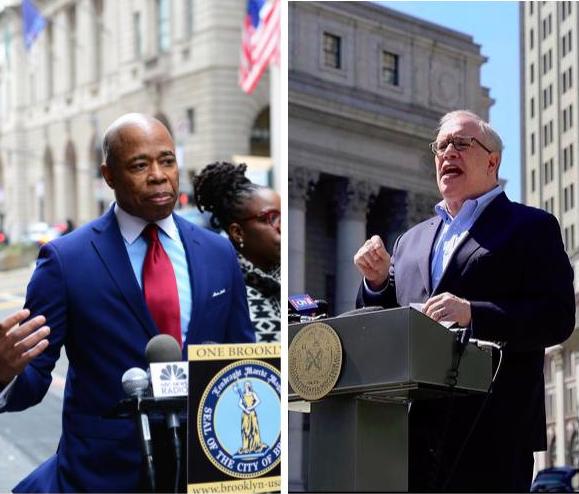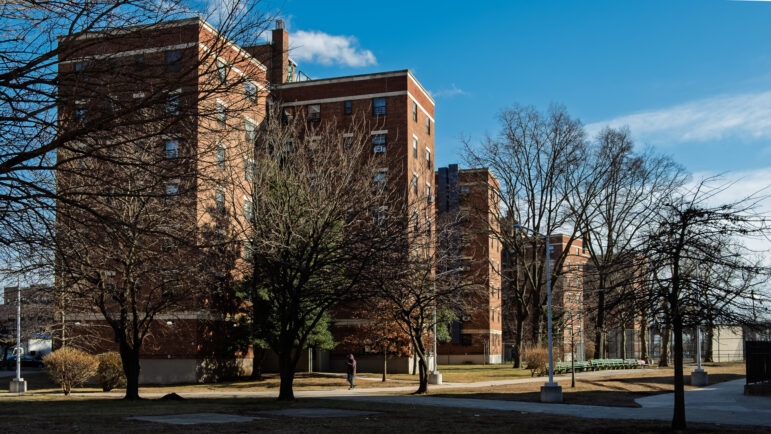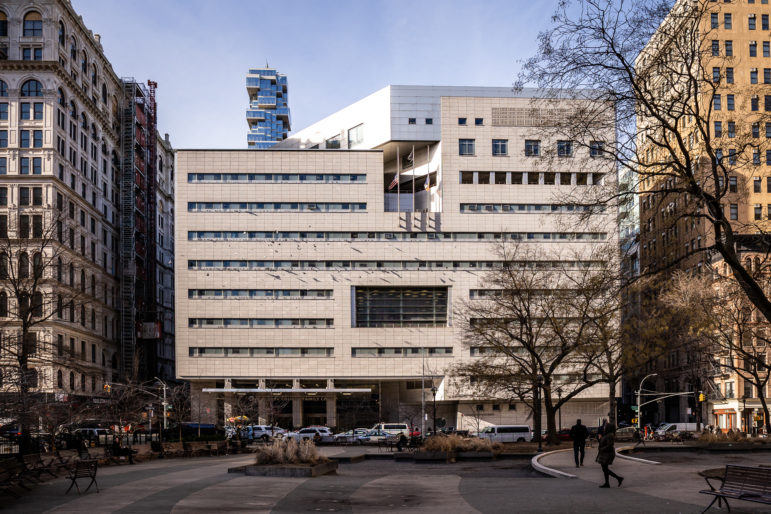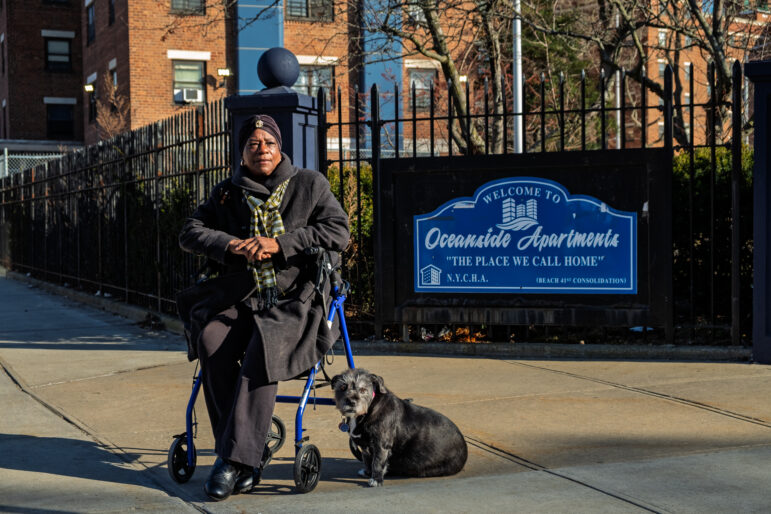The mayoral field has grown in recent weeks, but the first dose of public financing will be based on who had what in mid-July.

Office of the Borough President/NYC Comptroller
Because they launched their campaign fundraising early and scored quick success, Brooklyn Borough President Eric Adams and City Comptroller Scott Stringer will likely be the only two mayoral gets to get a public financing payment on Dec. 15.In the crucial 2021 city elections, which are expected to draw a record number of candidates and generate an unprecedented amount of public financing, Dec. 15 looms as a milestone: The day the first matching funds go out to campaigns.
However, only a few campaigns are likely to receive an infusion of funds, thanks to a quirk in the city’s political calendar.
Political scandals in the 1980s led New York City to adopt its landmark Campaign Finance Act, which limited campaign contributions and required disclosure of how candidates raised and spent money. The Act also created a public financing system under which qualifying candidates who agreed to a spending cap would receive a limited match for donations from city residents. The match is designed to amplify the impact of small donations and create a more even playing field.
The particulars of the program have evolved from a $1-to-$1 match up to $1,000 in 1989 to this year’s $8-to-$1 match on the first $250 donated from any city resident if it’s for a citywide office, and the first $175 for other contests*.
Not every candidate gets the match, however. Each must qualify by raising a certain amount of matchable funds from a minimum number of residents. For instance, in the 2021 mayoral race, a candidate must haul in $250,000 in matchable contributions from 1,000 residents in order to qualify.
In 2001, the Campaign Finance Board—which enforces the law and operates the public-financing program—paid out more than $36 million in matching funds, the most ever. Only $16.4 million in payments went out in the last citywide election in 2017.
Late growth makes for big field
With term limits forcing many offices open, ranked-choice voting creating new paths to victory and the more generous matching rate granting financial viability to more candidates, the 2021 election will likely set a new record for spending on public-financing.
In the marquis mayoral race, the field is developing rapidly. In recent weeks, Ray McGuire and Isaac Wright jumped into the fray, Max Rose and Christine Quinn were said to be considering runs, and Eric Adams, Dianne Morales and Shaun Donovan officially announced their candidacies, as Scott Stringer, Maya Wiley, Carlos Menchaca and other hopefuls continued to campaign.
While the cast of characters is shifting almost daily, the finances of the race are frozen in mid-summer. The last date when candidates filed official fundraising disclosures was July 15. And it is the fundraising accomplished up to that date—and not after—that will determine who qualifies for matching fund payments on Dec. 15 and how much each gets.
Another payment scheduled for January 15 is also based on the July numbers. Not until February will updated figures—those the campaigns report on Jan. 15—be used to generate payments.
Stringer and Adams likely to get paid
The long look-back means that Stringer, the city comptroller who had raised $2.8 million by July, and Adams, the Brooklyn borough president with $2.6 million collected, will likely be the only mayoral candidates to receive matching funds in the first round.
In other contests, the wealth will spread more broadly.
Candidates for the other citywide offices—public advocate and comptroller—must raise at least $125,000 from 500 city residents. All three leading Democrats in the comptroller race (Brian Benjamin, Brad Lander and David Weprin) had at least met the dollar threshold by July. No one reported much fundraising in the public advocate contest, one of the few races next year in which the incumbent, in this case Jumaane Williams, is not term-limited.
Several borough president campaigns might have passed the threshold, which varies according to each borough’s population. Council campaigns face a $5,000 threshold, and a few dozen of those look likely to meet the mark.
Early and new
The December payout comes roughly six months before the June 22 primary and nearly 10 months before the Nov. 2 general election. Even accounting for this year’s shift from a September to a June primary, that’s early: In 2017, the first public funds payout occurred on Aug. 3, about six weeks before the Sept. 12 primary.
The earlier schedule was mandated in a law passed in 2019 by the City Council that Mayor Bill de Blasio neither signed nor vetoed. During the discussions around that bill, CFB chair Amy Loprest warned of the double-edged sword of early payments.
“Making payments earlier and more frequently in the election cycle mitigates the stress of waiting until just five weeks before the election to receive a first payment of public funds. An earlier payment schedule also gives candidates more time to address any compliance issues,” she told the Council. “That said, the risk associated with paying candidates who do not face serious opposition or who do not end up running serious campaigns increases when payments are available so early in the election cycle,” and such payments “could undermine public support for the program.”
The Dec. 15 payments are likely to reveal an additional different risk: that an early injection of money into the race will inflate the financial advantage of some candidates (namely Adams and Stringer) before most of the field has had a chance to demonstrate their viability.
While the Council’s law establishes new payment dates for matching funds, the Campaign Finance Board—a five-member body appointed by the mayor and Council speaker—sets the disclosure dates for campaigns to report their fundraising. Had the board added a fall 2020 disclosure deadline, the Dec. 15 matching-funds payment would have reflected a more up-to-date picture of fundraising. It was unclear at press time whether the board considered doing so at any point after the new law passed in July 2019.
Threading the needle
The tension Loprest described between responding to candidates’ needs and protecting taxpayer dollars is threaded through the public-financing program. The $250,000 and 1,000 donor thresholds themselves are meant to make sure that a candidate is viable before granting them public funds—but of course, that means some candidates never qualify for payments.
In the 2017 Democratic primary, three of incumbent de Blasio’s Democratic opponents failed to qualify for matching funds and a fourth did not participate in the program. However, since de Blasio faced that token opposition, he did get public money for the primary: $2.9 million.
Because Republican Nicole Malliotakis faced no primary, only de Blasio received funds in the first few payment rounds of 2017. Once the general election campaign started, Malliotakis was awarded public money. In the end, those funds did even the playing field somewhat. Although de Blasio raised 5.5 times as much private money, he outspent Malliotakis overall by a smaller, 3:1 margin.
*Correction: The original version of this article erroneously indicated that the match was based on $175 for all offices.










One thought on “First Matching Funds of ’21 Mayor’s Race Likely to Favor the Few”
Well, the anti corruption league is working differently.
https://showthebooks.org/politico